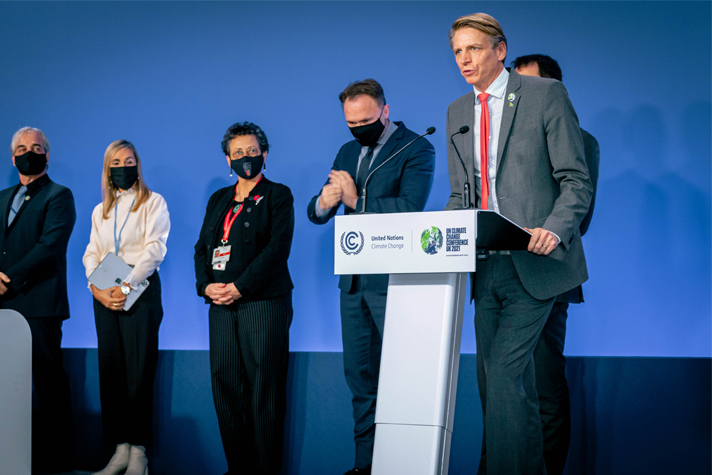On the evening of Saturday 13 November, the UN Climate Summit COP26 concluded in Glasgow. The main successes of the meeting were to encourage countries to refine their climate targets early next year, support for climate adaptation will be doubled by 2025, and the role of fossil fuels in climate change will be mentioned for the first time.
Before and during the meeting, much revolved around the need to increase ambition in global climate action, and the gap between countries’ current commitments and the Paris Agreement’s 1.5 degree target. Countries’ commitments are determined at the national level and are therefore not subject to negotiation. But the meeting’s collective resolution includes writings about phasing out coal and fossil subsidies, more ambitious commitments on the 1.5-degree goal, the importance of a just transition, and human and indigenous rights. Parties are now encouraged to ensure the meaningful and inclusive participation of young people.
Limiting heating to 1.5 degrees will require a lot of us, but the decision we made in Glasgow is laying the groundwork to make that possible. During these two weeks, the countries of the world have shown that they can agree on even the most difficult climate decisions and take great strides forward. This will not be enough, but it will increase the pace of climate action and give us much greater opportunities to tackle the climate crisis, says Environment and Climate Minister Per Polund.
During COP26, countries also negotiated the last parts of the so-called rule book of the Paris Agreement with rules for how countries should implement their obligations under the agreement, the purpose of which is to limit temperature rise to a maximum of 1.5 degrees.
Climate Finance
One of the main negotiating issues of the meeting was climate finance, i.e. support for emissions reduction and climate adaptation in developing countries, and the goal of mobilizing $100 billion annually from 2020-2025. This is important for enabling climate change in developing countries and for these countries to be able to increase their ambition in their climate action. The British Presidency commissioned Bear Boland and his Egyptian colleague, Dr. Yasmine Fouad leads the negotiations on climate finance. Together, they proposed, among other things, that support for climate adaptation should double by 2025, something that was required of those most affected by climate change, and which also became part of the final decision.
Climate change is already causing massive damage in many places and making life difficult for millions of people. The message from the meeting is clear – support for climate adaptation will double by 2025. It will make a huge difference to all people who would otherwise have been hit hard by the climate crisis, says Environment and Climate Minister Beer. Poland
The meeting also decided what the process for the new co-financing objective should look like. A decision on such a target is expected in 2024.
International Cooperation and Trade in Reducing Emissions
Another issue is the rules for international forms of cooperation and trade in reducing emissions between countries. For Sweden, it was important that these rules did not allow for so-called double-entry bookkeeping for emissions reductions, as this would mean reduced climate ambition. It has now been agreed to avoid it. Sweden has also pushed for cooperation and projects being implemented to be covered by protection for example human rights and indigenous rights, and the introduction of the right of appeal for those who consider themselves to have been harmed as a result of activities under the regulations.
A critical issue has been the rules for how countries report their emissions. For Sweden and many other countries, it was important that all countries report their emissions in an equal manner and that some countries are not exempt from certain reporting requirements. The rules that have now been agreed mean that all countries need to report in a way that their emissions figures can be reviewed transparently.
Common time frames
At COP26, it was also decided to set a common time frame for when countries should update their commitments. This is the line that Sweden, the European Union and many other countries have endorsed because it enhances the possibility that countries will raise their ambition as quickly as needed to limit temperature rise to 1.5 degrees. The common timeframes will come into effect from 2031.
Injuries and losses
The meeting also agreed on the functions of the so-called Santiago Network and a process for deciding on the structure and financing of COP27. The aim is to enhance technical support to the most vulnerable developing countries in order to identify and obtain solutions to address the damages and losses arising from the climate negotiations. The meeting also agreed to hold a dialogue to discuss financing arrangements to confront, prevent and address the damages and losses caused by climate change.
initiative
During COP26, Sweden, along with many other nations and nations, joined the Beyond Oil and Gas Alliance (BOGA), which will act to counter new gas and oil extraction.
In connection with COP26, a high-level meeting was also held within the Leading Group on Industrial Change, which was launched by Sweden and India in 2019 to drive climate change in heavy industries. The meeting brought together ministers and business leaders who agreed to develop roadmaps to achieve net zero emissions in heavy industries.

“Unapologetic writer. Bacon enthusiast. Introvert. Evil troublemaker. Friend of animals everywhere.”







More Stories
More than 100 Republicans rule: Trump is unfit | World
Summer in P1 with Margrethe Vestager
Huge asteroid approaching Earth | World